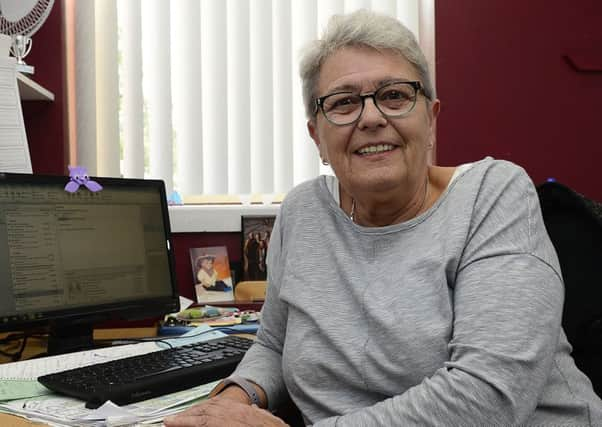'˜Civil rights should matter to both sides of our community'


The walls are covered in colourful collage works with photographs and timetables for the many classes on offer from cookery to maths and English; a group of women have gathered with their knitting and are chatting away happily in a common room; the kitchen is well stocked with biscuits and tea and coffee-making facilities; a small creche area is busy.
“Anyone can drop in,” explains Eileen, “Anyone who just needs to chat or who needs advice with something, it doesn’t matter what their background is, we are here to help. Protestant, Catholic, we don’t make distinctions, it doesn’t matter about your race or your religion.”
Advertisement
Hide AdAdvertisement
Hide AdA small and sprightly woman with cropped hair and lively brown eyes, Eileen, 63, shows me into her office, where she oversees various programmes on offer at the centre, leading courses that are designed to boost the self-esteem and confidence of the women who arrive there often struggling with the effects of deprivation, poverty, abuse or trauma.
Over the past 30 years Eileen, who grew up on the Shankill, has campaigned for better rights for women since she arrived at the centre in the 1990s and has championed cross-community and peace-building projects that have led to her recently being recognised with two prestigious accolades: in March she received the 2018 Community Relations Exceptional Achievement Award and a few weeks ago she was presented with the Conn McCluskey civil rights award; previous recipients of the latter include John Hume and Ivan Cooper.
“We [at the Shankill Women’s Centre] were working with women on the Falls well before the Good Friday Agreement,” says Eileen. “We were always supporting each other, there was never any division. And we’ve continued that trend of helping each other and campaigning for better rights for both sides of the community. The civil rights movement is often talked about in the media as a republican or nationalist issue, which is nonsense because of course Protestants and unionists must have their rights recognised too. Civil rights is not a green or orange issue as it has often been presented. A Bill of Rights is something all of us are entitled to and something I would like to see.”
Weir seems to have grown up with a strong sense of social justice. At 16 she joined the UDA believing it was a way of “helping the older people behind the barricades, the elderly where there was trouble, ensuring that they got their tea and milk and sugar.
Advertisement
Hide AdAdvertisement
Hide Ad‘‘I saw it as a caring role. I felt it was important. My ma didn’t know because she would have killed me. But I think I was misinformed. I was led to believe that I was standing up for the rights of my community.”
Eileen left the UDA, which in those days was not a proscribed organisation, when she began to question its objectives. “For some reason they used to block the Shankill Road every Saturday for an hour-long protest. It made me think, ‘Why would they block the road and cause trouble for their own community?’ And I decided to leave.”
Eileen started working on the floor of Gallaher’s Tobacco Factory when she was 25 and soon became a shop steward and a passionate trade unionist. The union had a women’s advisory committee where Eileen met lots of inspirational women. “Monica McWilliams and May Blood taught me a lot and I became very interested in the civil rights campaign and in socialist ideas. I remember back then one of the first things we were asked to do was to support the campaign to end strip searching in prisons. That was seen as a republican issue, the prisoners in Armagh prison were mainly women republican prisoners. But I thought, is it right to strip search anybody? And I had to say no, it wasn’t right. So I campaigned through the trade union movement.”
After being made redundant from Gallaher’s in the 1990s Eileen struggled to know what to do next. For a time she bought a black taxi and offered tours of Belfast for visitors. Ever the trailblazer, she was the only female on the ranks at that time.
Advertisement
Hide AdAdvertisement
Hide AdBut she soon began volunteering at the centre. Women would come into the drop in and sit and chat, smoke and drink tea but Eileen was asked to come up with some programmes of activities for them to do. Soon she was offering a Steps to Excellence course that was focused on helping boost women’s confidence. Hospitality and literacy classes followed.
“Many of the women couldn’t read until they started to play Scrabble. It was always about trying to find a way to help them to learn without making them feel self-conscious or intimidated by the process.
“It was very much about telling women: ‘Don’t let anybody tell you who you are or what you can do, the only person who can do that is you. Be who it is you want to be and don’t let anybody else tell you any different.’”
Throughout the Troubles women campaigners from both sides of the divide worked together to affect social change and as Eileen believes were instrumental in securing a yes vote for the Good Friday Agreement.
Advertisement
Hide AdAdvertisement
Hide Ad“The women’s movement was always working across the political divide. We weren’t shaking hands, we were hugging each other. We didn’t feel any division. We on the Shankill didn’t want funding unless the women on the Falls were getting it too. We were out walking together. And we’ve been doing that for 30 years.”